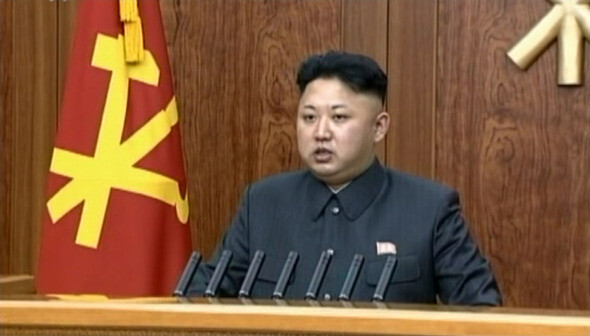hankyoreh
Links to other country sites 다른 나라 사이트 링크
Seoul doubts sincerity of N. Korea’s calls for improved relations

By Kim Kyu-won, staff reporter
The South Korean government responded negatively to North Korean leader Kim Jong-un’s reference to improving inter-Korean relations in his New Year’s address on Jan. 1, explaining that there are doubts about Kim’s sincerity. Inter-Korean relations have been strained since the North unilaterally cancelled the reunions of divided families in the fall of last year, and it is likely that relations will remain tense for the time being.
In a official statement showing the government’s position on the North’s New Year’s Address issued by the Ministry of Unification on Jan. 3, the government said, “North Korea mentioned ‘an atmosphere of improving inter-Korean relations’ in its recent New Year’s address, but we have no choice but to doubt its sincerity in that area. In order to improve inter-Korean relations, North Korea has to adopt a sincere attitude for building trust, and it has to make a genuine effort to denuclearize.”
This was in essence a negative response to Kim’s comments on Jan. 1 that South Korea must step forward to improve relations with the North and that the North will also work proactively to improve inter-Korean relations.
In the official statement, the ministry said, “North Korea proposes putting an end to slander, but it was the North that condemned an overseas tour by South Korea’s president as ‘the act of an obsequious traitor.’ North Korea tells us not to create a disturbance about pro-North Korea elements, but it is the North that has instigated the pro-North elements on countless occasions. The North called for reconciliation, unity, and unification last year as well, but after that it hindered inter-Korean relations with a nuclear test, military threats, and the suspension of operations at the Kaesong Industrial Complex.” In addition, the paper mentioned how North Korea had suddenly canceled the reunion of divided families in 2013 only four days in advance and how the North had immediately executed Jang Song-thaek after a show trial.
Analysts say that the South Korean government’s negative response is mainly intended to prevent Pyongyang from taking the lead in inter-Korean relations.
“This appears to be a message that Seoul does not intend to be led around by Pyongyang. This hardline stance could make it harder to resolve inter-Korean relations,” said Dongguk University Professor Kim Yong-hyun. “I think it would have been good for the South Korean government to make one more proposal to hold reunions of divided families.”
Nevertheless, other experts believe that it is more important to watch what North Korea does than what it says.
“There is no reason to jump just because Kim Jong-un says to jump,” said Yu Ho-yeol, a professor at Korea University. “We should move forward gradually as we confirm that there is genuine change in North Korea at the Kaesong Industrial Complex. If we take what Kim said at face value, we could find ourselves in trouble.”
Please direct questions or comments to [english@hani.co.kr]

Editorial・opinion
![[Column] Season 2 of special prosecutor probe may be coming to Korea soon [Column] Season 2 of special prosecutor probe may be coming to Korea soon](https://flexible.img.hani.co.kr/flexible/normal/500/300/imgdb/original/2024/0426/3317141030699447.jpg) [Column] Season 2 of special prosecutor probe may be coming to Korea soon
[Column] Season 2 of special prosecutor probe may be coming to Korea soon![[Column] Park Geun-hye déjà vu in Yoon Suk-yeol [Column] Park Geun-hye déjà vu in Yoon Suk-yeol](https://flexible.img.hani.co.kr/flexible/normal/500/300/imgdb/original/2024/0424/651713945113788.jpg) [Column] Park Geun-hye déjà vu in Yoon Suk-yeol
[Column] Park Geun-hye déjà vu in Yoon Suk-yeol- [Editorial] New weight of N. Korea’s nuclear threats makes dialogue all the more urgent
- [Guest essay] The real reason Korea’s new right wants to dub Rhee a founding father
- [Column] ‘Choson’: Is it time we start referring to N. Korea in its own terms?
- [Editorial] Japan’s rewriting of history with Korea has gone too far
- [Column] The president’s questionable capacity for dialogue
- [Column] Are chaebol firms just pizza pies for families to divvy up as they please?
- [Column] Has Korea, too, crossed the Rubicon on China?
- [Correspondent’s column] In Japan’s alliance with US, echoes of its past alliances with UK
Most viewed articles
- 1[Column] Season 2 of special prosecutor probe may be coming to Korea soon
- 2‘We must say no’: Seoul defense chief on Korean, USFK involvement in hypothetical Taiwan crisis
- 3Is N. Korea threatening to test nukes in response to possible new US-led sanctions body?
- 4Amnesty notes ‘erosion’ of freedom of expression in Korea in annual human rights report
- 5Division commander ordered troops to enter raging flood waters before Marine died, survivor says
- 6N. Korean delegation’s trip to Iran shows how Pyongyang is leveraging ties with Moscow
- 7[Editorial] Korea’s surprise Q1 growth requires objective assessment, not blind fanfare
- 8Is Japan about to snatch control of Line messenger from Korea’s Naver?
- 9No good, very bad game for Korea puts it out of Olympics for first time since 1988
- 10[Reportage] On US campuses, student risk arrest as they call for divestment from Israel